International Journal of Cognitive Research in Science, Engineering and Education @ijcrsee
Статьи журнала - International Journal of Cognitive Research in Science, Engineering and Education
Все статьи: 494
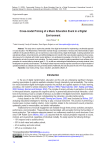
Cross-modal Priming of a Music Education Event in a Digital Environment
Статья научная
This study aims to explore the potential of the digital environment for implementing a multimodal approach in music education. The effectiveness of information received through a combination of sensory stimuli demonstrates a higher coefficient of educational efficiency and is examined as cross-modal priming. Digital technologies: including specialized and educational software, virtual instruments, and artificial intelligence (AI), transform the music education experience into an accessible resource for individuals with limited musical abilities or non-professional knowledge in the field of art. This justifies their consideration as tools for general music education. The study presents a model for applying specialized music software in the perception of a musical piece by students (aged 12–13), as well as a methodological framewoamong university students, future kindergarten and primary school teachers. The findings indicate improved musical-cognitive outcomes and a high evaluation of specialized software as a didactic tool among university students. Additionally, the study discusses the role of AI in music education.
Бесплатно
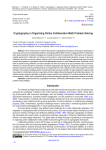
Cryptography in Organizing Online Collaborative Math Problem Solving
Статья научная
The aim of this study is to examine the potential of cryptographic techniques in enhancing the organization of online group work for solving mathematical problems, while applying differentiated instruction. Engaging students in mathematics often requires additional motivational strategies and compelling incentives for sustained effort. Online group work presents a valuable opportunity for collaboration and intensive communication in solving mathematical problems. However, it also poses challenges, particularly concerning academic integrity and the risk of unauthorized copying. To address these issues, this study proposes the integration of cryptographic protocols with differentiated instruction in online collaborative tasks. Specifically, various levels of problem-solving assistance are made accessible only when the majority of the group members reach a consensus. Assistance is unlocked through the submission of individual cryptographic key segments, assigned by the instructor. A group password-required to access incremental guidance-can be generated only when a sufficient number of key segments have been submitted. This mechanism facilitates progress monitoring and fosters group accountability. The paper illustrates this approach with an example from mathematics instruction, supported by a Python-based software tool designed to aid collaborative learning. The software employs Lagrange interpolation to generate unique key parts for each participant. The method was piloted with six pre-service teachers in Serbia, and the qualitative findings are discussed alongside implications for educational research and practice.
Бесплатно
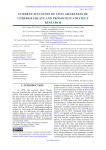
Current situation of civil awareness of undergraduate and promotion strategy research
Статья научная
We conducted on a questionnaire survey for the current college students’ civic awareness from four aspects of equality consciousness, national consciousness, freedom consciousness and public consciousness. Survey data was analyzed with the SAS® statistical software, the results shown that some of our country’s College Students with a strong national consciousness, and their patriotic feeling is deep at present. They identity the consciousness of equality, but their awareness of fighting for rights is not strong. They have a sense of freedom, but some students are not clear about the relationship between freedom and law. Their enthusiasm to participate in public affairs is not high. Their awareness of social morality is not comprehensive. The reason is that the influence of traditional culture and the political development can’t keep up with the development of economy and the systematic citizenship education is lacked. Finally, we put forward a method of improve the civic awareness of Contemporary College Students in this paper.
Бесплатно
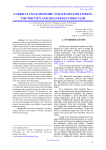
Curriculum leadership: strategies for linking the written and delivered curriculim
Отчет
The focus will be put on teachers as curriculum leaders, being challenged on a daily basis by how to attend to the delivered curriculum(the practice) without neglecting the written curriculum(the theory), and vice versa, all the while analyzing strategies that will link both curricula and implement these conclusions in their further teaching practice. Curricula present written guides identifying the content and material that should be covered, and are given to teachers (sometimes) as a detailed guide to follow religiously. However, as opposed to theory, practice is a different and delicate matter, as the teachers tries not to overstep the boundaries of the curriculum already include as much of their own creative energy as possible. These points will be expanded through analysis of the results of a qualitative research on the understanding of the content of leadership, done on pre-school and primary school teachers, whose everyday contact with their pupils will illustrate the reality of leadership in schools in the local context of R. Macedonia. Furthermore, the “how” of overcoming the challenges on the path of successful school leadership, however tricky they might be will be analyzed from firsthand experiences and compared through the matrix of what is considered able to “correct”. As educators, we successfully bridge the gap between theory and practice, to apply the theoretical know-how in a realistic classroom setting, and to convert the written paradigms into practice, thus only through educational leadership can we overcome the pedagogical challenges and effectively transfer the knowledge to the students, bringing about positive outcomes.
Бесплатно
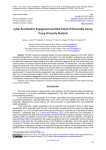
Cyber socialization engagement and dark tetrad of personality among young university students
Статья научная
The article considers the relationship between the cyber socialization engagement and the Dark Tetrad of personality (Machiavellianism, narcissism, psychopathy, and sadism). The cyber socialization engagement was understood, according to the author's concept, as having constructive and destructive components. The study purpose was to identify correlation and deterministic relationships between indicators of the cyber socialization engagement and the Dark Tetrad among young university students. The sample included 424 students from Russian universities. For measurements, «The cyber socialization engagement questionnaire» and «The Short Dark Tetrad Scale» were used. It has been established that the relationship between the indicators of the cyber socialization engagement and the Dark Tetrad has a qualitatively heterogeneous character - from the complete absence of connections to mutual determination. The strongest mutual determination is associated with the everyday sadism: it increases the destructive engagement in cyber socialization, explaining 12% of the total variance, and the latter, in turn, increases the severity of sadism (10.5%). It is advisable to take into account the revealed connections between the general cyber socialization engagement and the Dark Tetrad of the personality when organizing psychological support for the socialization of students in the context of expanding social interactions carried out in cyberspace.
Бесплатно
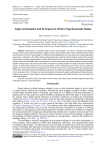
Cyber-victimization and its impact on Victim’s Psychosomatic Status
Статья научная
Cyberbullying is an important issue to discuss and investigate. This study is a theoretical and empirical research aimed at proving cyber-victimization’s negative impact on psychosomatic health. A direct relationship between these two phenomena is that poor mood regulation in childhood entails dissatisfaction with surrounding world causing rage against weaker peers, victimization, which affects victims’ psychosomatic status. Methods used are literature analysis for the research and empirical part assessing aggressiveness in children (Buss-Darkey Inventory), their emotional state and psychosomatic health problems caused by victimization (authors’ questionnaire. As a result young victims’ psychosocial problems are seen as having negative consequences in later life. Because of these consequences, bullying becomes a hot topic and causes researchers, parents’, as well as school teachers and school psychologists’ concern. Cyberbullying will continue as long as electronic gadgets and communication devices are plugged in and used which is becoming an increasing problem due to dissemination of information, telecommunication technologies and the involvement of children and adolescents in the widespread digitalization of various spheres of life. In conclusion we recommend teachers and parents to develop understanding of cybervictimization, besides to pay attention to their children’s emotional intelligence development that should help them resist victimization and avoid health problems.
Бесплатно
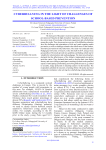
Cyberbullying in the light of challenges of school-based prevention
Статья научная
The main goal of the paper is to present opinions about cyberbullying prevention in Poland in the light of teachers’ experiences. The authors show the current state of knowledge of electronic aggression and cyberbullying among the youths. They also present an overview of the difficulties educators face, the challenges and expectations of kids and youth regarding media prevention, as well as challenges related to the effectiveness of the modern, innovative prevention of risky behaviours. The study was conducted in the Pedagogical University of Cracow, in the first half of 2019, using a focus group method. The results provide new guidelines and findings which may be valuable for school practice and media pedagogy. The interviewed teachers declared that the effectiveness of the hitherto implemented preventive activities varies. They declared their need to develop their own digital literacy and were willing to participate in trainings focused on the practical aspects of anticipating cyberbullying and solving difficult cases (e.g. related to sexuality, image protection or attacking teachers via the Internet). The respondents admitted the necessity of joining efforts with police and local community institutions when solving the cyberbullying-related problems.
Бесплатно
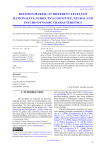
Статья научная
In modern science, the issue of studying the decision-making process is challenging. If these decisions are connected with finances: monetary gains or losses - the problem becomes even more acute. Decision-making is almost always connected with risk and uncertainty. In order to investigate the problem of financial decision-making at risk laboratory studies have been conducted to determine the degree of rationality of such decisions as well as the neural and psychodynamic characteristics of the subject. This paper presents the results of the study of this problem at the extreme values of the probability of a gain or a loss - 0.99 and 0.01.
Бесплатно
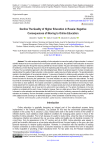
Статья научная
This article analyzes the possibility of online education to ensure the quality of higher education. A review of scientific literature led to the conclusion that in the Russian scientific discourse, the potential of online education to ensure the quality of higher education through the resource potential has not been studied. The goal is formulated as follows: to determine the sufficiency of online learning resources to ensure the expected quality of education in a social institution of higher education in Russia. The neo-institutional approach is the methodological basis. Before the empirical research, the basic concepts were operationalized: the quality of higher education, online education, quality resources of higher education. The operationalization resulted in the identification of two empirical indicators: 1) resources of students for obtaining quality education in the context of online education; 2) resources of professors to ensure the quality of education in environment of online education. They formed the basis for structuring the questionnaire. The same indicators are used to analyze the data obtained. The study found that the overwhelming majority of professors indicated a sharp decline in the effectiveness of their educational activities on the Teams or Zoom platforms. This includes a decrease in professional motivation and interest in the end result of work, mental detachment from students and indifference to them, increased anxiety due to fears of deteriorating health, indifference to professional development, loss of visual and non-verbal control over students, etc. The opinion of professors on the main positions is correlated with the point of view of students. However, there is a stable group of about 25% among learners that is focused on online education and demonstrates the belief that in the context of e-learning, resources for obtaining quality of education are increasing. We have formulated a proposal according to which this group of students should study in special online (digital) schools according to an abbreviated program, where accelerated vocational training is a priority.
Бесплатно
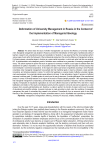
Статья научная
The article raises the issue of whether managerialism can improve the efficiency of university management. Managerial management was adopted in Russia to promote the intensification of three types of professional activity of teachers: research work, educational process and socialization of students. It was assumed that the more teachers perform various types of work within the framework of their professional employment, the more the efficiency of management will grow. For these purposes, universities began to function as a quasi-market corporation, in which each actor had their own personal KPI. Its implementation and subsequent growth of indicators were considered as a guarantee of increasing managerial efficiency. The authors express the opinion that such an approach is erroneous in relation to such types of activities where flow assessment of quality is impossible. It is an unsuccessful example of the transfer to higher education of those practices that have developed in commercial corporations. In this regard, the authors put forward a hypothesis according to which Russian universities under managerial management have partially lost their traditional goals: to teach a profession, create scientific innovations, and introduce students to culture. To confirm this hypothesis, a universal model of effective university management was developed. Four empirical indicators were defined on its basis: 1) clear articulation of goals; 2) provision of sufficient resources to achieve goals; 3) reliable system of control over the use of resources; 4) social significance of the manufactured product. A survey of university teachers in six regions of the south of Russia (sample population - 849 respondents) showed that managerial management unreasonably commercializes the professional activities of teachers, that the overwhelming majority of employees of educational organizations do not have sufficient resources to fulfill their KPIs, that there is mass falsification and imitation of the results of professional activity, that the academic community has lost its subjectivity, is under pressure from university administrations and, therefore, is unable to perform the function of proper control over the quality of educational and scientific activities. A general conclusion is made according to which under the conditions of managerial management the goals of universities have ceased to be achieved. Consequently, from an economic point of view, state financing of the overwhelming majority of Russian universities seems to be an unprofitable and unpromising undertaking.
Бесплатно
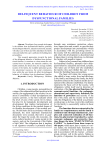
Delinquent behaviour of children from dysfunctional families
Отчет
The subject of my research in the paper is the children from dysfunctional families, primarily their delinquent behavior, education and moral, actually, who takes care of them and who undertakes the family roles and whether this care is sufficient for building these personalities. This research approaches towards the study of the delinquent behavior of children from dysfunctional families. It examines to what extent the educational level of parents, the material condition, the health condition, the leisure time, the average monthly income of the family, the available permanent goods, the educational resources, the social communications within the very family, all affect the delinquent behavior of children from dysfunctional families.
Бесплатно
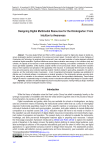
Designing Digital Multimodal Resources for the Kindergarten: From Intuition to Awareness
Статья научная
The study adapts McNeill and Robin’s (2012) evaluation system for digital story design to identify pre-service kindergarten teachers’ perceptions of its process and product aspect. Conducted within the course Pedagogy of Construction and Technology, the empirical study involves self-, peer, and expert evaluation of custom-designed multimodal educational digital ensembles. Significant differences across these evaluation axes emerge in the indicators clarity and cohesion, the capacity of the resource to render symbolic/metaphorical meanings, and students’ consideration of the audience’s age-related capabilities. Unlike students, experts manifest a more pronounced criticism, because their evaluation draws on their experience and perception of the applicability of the resources. To contextualize the three axes of evaluation, focus group discussions were conducted exploring students’ intentions related to goal setting, preparation, the author’s presence, and the multimodal modes of expression. A lack of specialized technological knowledge was established for effective use of multimedia software. Inconsistencies in students’ perception of the storyboarding process were also identified, along with an orientation to the audience’s motivation rather than to their age-related characteristics. These findings highlight the need for a systematic design of university courses in educational multimodal digital design for Education majors.
Бесплатно
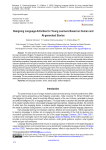
Designing Language Activities for Young Learners Based on Human and AI-generated Stories
Статья научная
The article presents the results of a study conducted among novice teachers of English language, trained at two major universities in Bulgaria. The objectives of the study were: 1) to evaluate the extent to which students perceived stories, authored by human and artificial intelligence, as applicable in educational context; 2) to gain an insight into their competence to design story-based language learning activities for preschool and primary school children; and 3) to seek possible relations between their teaching competence, language proficiency levels, skills to use AI-tools and their perceptions of the usefulness and practical classroom application of the two types of narratives. Results showed that students viewed both types of texts as useful in foreign language teaching, but the displayed degree of usefulness was stronger for the AI-generated one. A tentative explanation of this finding could be the capacity of ChatGPT as a large language model to mimic human linguistic production fairly convincingly. Overall, students exhibited a reasonably high degree of understanding of language learning as a collaborative experience and showed abilities to apply interactive approaches and techniques in the activities they proposed. The higher the teaching competence of the participants, the stronger their awareness of the various interdisciplinary links a teacher can make in their language classes to other fields of knowledge. This is a promising indication for the capacity of teachers to capitalize on the affordances of story-based language learning and interweave cross-curriculum references in their teaching practices which brings added value to the learning process.
Бесплатно
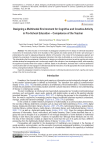
Статья обзорная
This article focuses on the formation of pedagogical competence for the design of multimodal educational environment, the functionality of which is the foundation of the cognitive and creative activity of the child in pre-school age. It problematizes the need for adequate professional reflection of the teacher in the context of the transgressive approach and highlights the parameters of organizing pedagogical interactions that utilize multimodality as a communication phenomenon. The understanding that the competence of the teacher for designing a multimodal environment as well as cognitive and creative activities develops as transgressive and is continuously created in the cultivation of new knowledge and skills, while expanding the cognitive and practical limits of the subject, is affirmed. Based on this affirmation, the thesis that if a child has entered the “communicative state” and has engaged in multimodal educational interactions, the child appropriates the social experience by forming a transgressive attitude of behavioral response.
Бесплатно
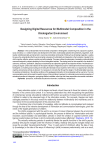
Designing digital resources for multimodal composition in the kindergarten environment
Статья обзорная
In the contextual field of environmental composition in kindergarten, transforming it into a space for cognitive, social, emotional, i.e., holistic formation and development of the child, multimodality operates with authenticity, magnetism, multilevelity, multidimensionality, and dynamism to overcome schematicity and linearity of thinking, thus stimulating imagination. Leading the way is the understanding that the environmental composing of multimodality in kindergarten is the foundation of quality for the child’s cognitive, affective, sensory cognition and self-knowledge. This paper outlines the parameters of evaluating multimodal digital resources designed by students preparing for future kindergarten teachers. The starting points for their expertise in the relations of autonomy, coherence, justification, adequacy and authenticity as subjectively significant and objective wholes of multimodal composing are argued. Criteria and indicators for the expert evaluation of digital resources for multimodal environmental composing in kindergarten, as modeling and provoking and enriching the individual sensory experience of the child, as an opportunity to stimulate cognitive and personal activity are derived. It is necessary to conclude that through the design of multimodal digital resources, the existing contradictions in the starting conditions of the pedagogical interaction in the kindergarten will be overcome. The main recommendation points to the need for specific training of future children’s teachers for multimodal environmental composition of educational practices in kindergarten, synergizing different modalities, rather than their linear sequential environmental combination.
Бесплатно
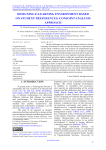
Designing e-learning environment based on student preferences: conjoint analysis approach
Статья научная
The aim of this paper was to determine students’ preferences towards e-learning environment in order to select and design its components that suit the needs of student’s best. The research was implemented using conjoint analysis. Three dimensions of interest were considered: e-learning technology, teaching method and knowledge assessment and the results show that knowledge assessment is the most important e-learning attribute for both traditional and online students. Adding into consideration the teaching method as well, further analysis showed that students can be profiled in two segments: oriented on results or process, which can be used at the beginning of studies to adjust e-learning environment. Research findings emphasized student preferences as essential for designing e-learning system, while student satisfaction turned out to be a key factor determining their persistence for studying in e-learning environment. Finally, recommendations for improvement of existing e-learning system were given.
Бесплатно
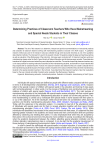
Статья научная
The aim of this research is to determine, interpret and provide recommendations on instructional practices and evaluation of classroom teachers working with mainstreaming students at schools in the North Cyprus. A qualitative research method was used in the research. Data was collected through semi-structured interviews as one of the qualitative data collection methods. The interview form used in the research included 10 questions related to design and teaching practices as well as evaluation of the effectiveness of the instruction. Interviews were conducted with 12 classroom teachers working at mainstreaming classes under the North Cyprus Ministry of National Education and all interviews were recorded. These data were transferred to a digital environment where they were interpreted as code titles. The results showed that classroom teachers carry out in-class practices for teaching methods and activities of their mainstreaming students, and benefit from visual materials that they prepared with an assistant teacher. However, the classroom teachers also stated that they are unable to allocate time for their mainstreaming students because of the large numbers of students in the class and therefore they send their mainstreaming students to the special education teachers in their schools. It was determined that classroom teachers make their evaluations based on the level, interest and ability of students when evaluation the effectiveness of teaching.
Бесплатно
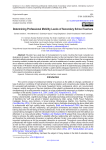
Determining professional mobility levels of secondary school teachers
Статья научная
Education has a great share in the development of a country. Countries that invest in education are developing in all respects. There are many factors that affect education, but the most important of them is the teacher. Because other factors affecting education do not make sense without a teacher. The better the teachers are trained, the more appropriate the working conditions, the better the quality of education, and thus the establishment of a modern, peaceful country. This study aims to determine professional mobility levels of secondary school teachers. Mixed research method was used in the study. A total number of 146 teachers including 60 teachers in the control group and 86 in the experimental group participated in the study. Results confirmed the effectiveness of activities to update students’ pedagogical experiences as a necessary step in the development of professional pedagogical mobility. Results are discussed with relevant literature and recommendations for further research and practices are provided.
Бесплатно
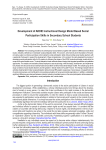
Статья научная
The increasing prevalence of contemporary social problems, together with citizens’ indifference toward these issues, indicates a deficiency in individuals’ social participation skills. This concern, which serves as the foundation of the present study, seeks to enhance secondary school students’ social participation skills while providing social studies teachers with a systematic framework to support the development of these competencies. In this context, this study designed the process of developing social participation skills for 5th graders by following the stages of the ADDIE instructional design model within the scope of the social studies course. The study adopted a mixed-methods research design that integrated quantitative and qualitative approaches. The analysis and evaluation phases employed a case study design, while the design, development, and implementation phases were structured around activity-based and problem-centered instructional design models. The sample group of the study consisted of social studies teachers and 5th graders in Gölcük District of Kocaeli Province. The findings indicate that the activities implemented to foster social participation skills enhanced fifth graders’ awareness of social issues, increased their level of social consciousness, and contributed to more positive perceptions of non-governmental organizations. In addition, a statistically significant difference was observed between students’ pretest and posttest scores on the social participation skills assessment.
Бесплатно
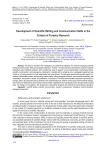
Development of Scientific Writing and Communication Skills in the Context of Forestry Research
Статья научная
This article is devoted to the investigation and experimental validation of a model for developing scientific writing and communication skills among students majoring in “Forestry”. The study included a scientometric analysis of scientific publications using CiteSpace software, which revealed key areas of research such as argumentation, inquiry-based writing, scientific communication, and metacognitive components. In parallel with the analytical work, a pedagogical experiment was carried out, involving students from both experimental and control groups. The skills were assessed across eight aspects: formulation of the scientific problem, text structuring, source citation, clarity and logical coherence, use of scientific vocabulary, data interpretation, visualization of results, and justification of conclusions. The results demonstrated a significant improvement (on average, 35%) in all components among students in the experimental group, while the control group showed minimal changes. This confirms the effectiveness of the practice-oriented model, integrated into the educational process through research-based tasks. The findings can be applied in the development of educational programs and methods for training forestry specialists.
Бесплатно

